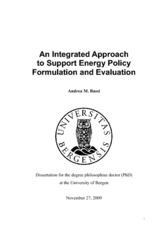| dc.contributor.author | Bassi, Andrea M. | eng |
| dc.date.accessioned | 2009-12-11T13:32:31Z | |
| dc.date.available | 2009-12-11T13:32:31Z | |
| dc.date.issued | 2009-11-27 | eng |
| dc.identifier.isbn | 978-82-308-0908-2 (print version) | |
| dc.identifier.uri | https://hdl.handle.net/1956/3662 | |
| dc.description.abstract | With the adoption of the Kyoto Protocol (UN, 1997) in 1997 and the recentincrease in energy prices, national leaders of industrialized countries have startedinvestigating options for reducing energy consumption and carbon emissionswithin national borders (UNFCCC, 2008). After ten years debating on whether theglobal and national economies would have been negatively impacted by theimplementation of such measures, rising global concerns on climate change urgepolicy makers to find ways to reduce the carbon intensity of the global economy(IPCC, 2007).Various proposals for reducing energy consumption and supply cleaner fuels havebeen examined during the years. Some countries opposed the adoption of drasticmeasures -such as the US, which has not yet ratified the Kyoto protocol, whileothers have taken the lead to support the diffusion of energy efficient technologyand promote the production of cleaner energy, such as Denmark and Germany. Asa matter of fact, different governments find themselves in different energycontexts that direct them towards taking dissimilar positions on energy issues.Evidently, the extent to which society, economy and environment shape policiesand react to their implementation change from country to country.The present study investigates whether contextualizing energy issues is relevant toprovide support to energy policy formulation and evaluation aimed at findingsustainable longer-term solutions to today’s and upcoming energy andenvironmental issues. Instead of applying the most widely accepted tools used tosupport policy formulation and evaluation, this research proposes the utilization ofa holistic framework that incorporates social, economic and environmental factorsas well as their relations to the energy sector, to better contextualize global,regional and national energy issues. This framework, which accounts for feedback loops, delays and non-linearity, is applied to case studies centered on the US toinvestigate the longer term performance of selected energy policies under a varietyof scenarios.Results of the research work carried out with five case studies, focused on thesimulation of various energy and climate policy options, indicate the likelyemergence of various unexpected side effects and elements of policy resistanceover the medium and longer term, due to the interrelations existing betweenenergy and society, economy and environment. Furthermore, side effects orunintended consequences may arise both within the energy sector and in the otherspheres of the model; nevertheless, these behavioral changes influence all society,economy and environment spheres. | en_US |
| dc.language.iso | eng | eng |
| dc.publisher | The University of Bergen | eng |
| dc.relation.haspart | Paper I: Energy for Sustainable Development 13(2), Bassi, A. M.; Baer, A. E., Quantifying Cross-Sectoral Impacts of Investments in Climate Change Mitigation in Ecuador, pp. 116-123. Copyright 2009 International Energy Initiative. Published by Elsevier Inc. Full text not available in BORA due to publisher restrictions. The published version is available at: <a href="http://dx.doi.org/10.1016/j.esd.2009.05.003" target="_blank">http://dx.doi.org/10.1016/j.esd.2009.05.003</a> | eng |
| dc.relation.haspart | Paper II: Energy Economics 2010 32(1), Bassi, A. M.; Schoenberg, W.; Powers, R., An integrated approach to energy prospects for North America and the rest of the world, pp. 30-42. Copyright 2009 Elsevier B.V. Full text not available in BORA due to publisher restrictions. The published version is available at: <a href="http://dx.doi.org/10.1016/j.eneco.2009.04.005" target="_blank">http://dx.doi.org/10.1016/j.eneco.2009.04.005</a> | eng |
| dc.relation.haspart | Paper III: Technological Forecasting and Social Change 77(3), Bassi, A. M.; Shilling, J. D., Informing the US Energy Policy Debate with Threshold 21, pp. 396-410. Copyright 2009 Elsevier Inc. Full text not available in BORA due to publisher restrictions. The published article is available at: <a href="http://dx.doi.org/10.1016/j.techfore.2009.10.007" target="_blank"> http://dx.doi.org/10.1016/j.techfore.2009.10.007</a> | eng |
| dc.relation.haspart | Paper IV: Bassi, A. M.; Drake, A.; Tennyson, E. L.; Herren, H. R., 2009, Evaluating the Creation of a Parallel Non-Oil Transportation System in an Oil Constrained Future. Full text not available in BORA. | eng |
| dc.relation.haspart | Paper V: Energy Policy 37(8), Bassi, A. M.; Yudken, J. S.; Ruth, M., Climate policy impacts on the competitiveness of energy-intensive manufacturing sectors, pp. 3052–3060. Copyright 2009 Elsevier Ltd. Full text not available in BORA due to publisher restrictions. The published version is available at: <a href="http://dx.doi.org/10.1016/j.enpol.2009.03.055" target="_blank">http://dx.doi.org/10.1016/j.enpol.2009.03.055 </a> | eng |
| dc.title | An Integrated Approach to Support Energy Policy Formulation and Evaluation | eng |
| dc.type | Doctoral thesis | en_US |
| dc.rights.holder | Andrea M. Bassi | en_US |
| dc.subject.nsi | VDP::Samfunnsvitenskap: 200 | nob |
